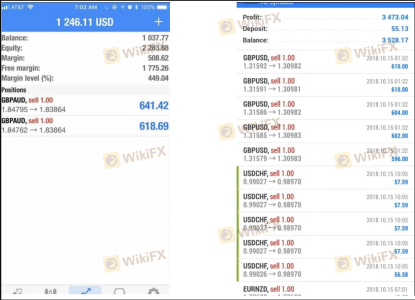Regarding the legitimacy of JP forex brokers, it provides ASIC and WikiBit, (also has a graphic survey regarding security).
Is JP safe?

Pros
Cons
Is JP markets regulated?
The regulatory license is the strongest proof.
ASIC Forex Execution License (STP)
Australia Securities & Investment Commission
Australia Securities & Investment Commission
Current Status:
UnverifiedLicense Type:
Forex Execution License (STP)
Licensed Entity:
GDFS TRADE INTERNATIONAL PTY LTD
Effective Date: Change Record
2016-02-18Email Address of Licensed Institution:
info@gdfstrade.com.auSharing Status:
No SharingWebsite of Licensed Institution:
--Expiration Time:
--Address of Licensed Institution:
GEORGE HALIKIOTIS 'EAKIN MCCAFFERY COX' L 28 1 MARKET ST SYDNEY NSW 2000Phone Number of Licensed Institution:
0405939933Licensed Institution Certified Documents:


Is JP Markets A Scam?
Introduction
JP Markets is a South African forex and CFD broker that has established itself in the competitive landscape of online trading since its inception in 2016. Catering primarily to retail traders, JP Markets offers a variety of trading instruments, including forex pairs, commodities, and indices, while promising a user-friendly trading experience. However, the forex market is fraught with risks, and traders must exercise caution when choosing a broker. This article aims to evaluate whether JP Markets is a safe trading option or a potential scam by examining its regulatory status, company background, trading conditions, client fund safety, customer experience, and overall risks associated with trading through this platform.
To conduct this investigation, we analyzed multiple sources, including user reviews, regulatory filings, and expert opinions. The assessment framework focuses on key aspects of broker reliability, such as regulatory compliance, financial stability, and user satisfaction.
Regulation and Legitimacy
The regulatory status of a brokerage is a crucial factor in determining its safety and legitimacy. JP Markets is regulated by the Financial Sector Conduct Authority (FSCA) in South Africa, which is responsible for overseeing financial services and protecting consumers. While the FSCA is not considered a top-tier regulator like the FCA in the UK or ASIC in Australia, it still imposes certain standards that brokers must comply with to ensure fair trading practices and financial transparency.
Here‘s a summary of JP Markets’ regulatory information:
| Regulatory Authority | License Number | Jurisdiction | Verification Status |
|---|---|---|---|
| FSCA | FSP 46855 | South Africa | Verified |
The FSCA requires brokers to maintain client funds in segregated accounts, ensuring that traders' funds are protected in the event of broker insolvency. However, JP Markets has faced scrutiny in the past, including a temporary suspension of its license in 2019 due to alleged regulatory violations. This incident raised concerns among traders about the broker's reliability. Nonetheless, the license was reinstated, and the company has since operated under the FSCA's oversight, indicating a commitment to compliance and regulatory standards.
Company Background Investigation
Founded in 2016, JP Markets has quickly become a prominent player in the South African forex brokerage industry. The company is owned by a local entrepreneur with extensive experience in finance and trading. The management team comprises professionals with backgrounds in investment banking and asset management, which adds credibility to the firm's operations.
Despite its rapid growth, JP Markets has faced challenges regarding transparency and information disclosure. While the company provides basic information about its services and regulatory status, it lacks comprehensive details about its management structure and financial health. This opacity can be a red flag for potential clients, as transparency is a key indicator of a trustworthy broker.
Overall, while JP Markets has a solid foundation and a growing client base, its history of regulatory scrutiny and limited information transparency necessitates careful consideration by prospective traders.
Trading Conditions Analysis
JP Markets offers a range of trading conditions, including competitive spreads and leverage options. However, the overall fee structure is a vital aspect to consider. The broker primarily operates on a spread-based model, with various account types available to meet different trading needs.
Heres a comparison of core trading costs associated with JP Markets:
| Fee Type | JP Markets | Industry Average |
|---|---|---|
| Major Currency Pair Spread | 2 pips | 1.5 pips |
| Commission Model | $3 per lot | $2 per lot |
| Overnight Interest Range | Varies | Varies |
The spreads offered by JP Markets are generally higher than the industry average, particularly for its standard accounts. Additionally, the commission structure for the VIP account may not be competitive when compared to other brokers. These fee structures can significantly impact trading profitability, especially for high-frequency traders.
Traders should also be aware of potential hidden fees associated with withdrawals and inactivity. While JP Markets claims to have no deposit fees, users have reported delays and unclear policies regarding withdrawal processing times, which can be frustrating for clients wishing to access their funds quickly.
Client Fund Safety
The safety of client funds is paramount when evaluating any brokerage. JP Markets claims to implement robust measures to protect client funds, including segregated accounts and negative balance protection. This means that client funds are kept separate from the company's operational funds, reducing the risk of loss in the event of financial difficulties.
However, the broker's historical controversies raise questions about its commitment to fund safety. While the FSCA requires certain protections, the effectiveness of these measures is contingent upon the broker's adherence to regulations and its operational integrity.
Traders should also consider the broker's approach to risk management and whether it has faced any significant security breaches or fund mismanagement incidents in the past. Although JP Markets has not reported any major issues recently, the broker's past regulatory scrutiny suggests that potential clients should remain vigilant regarding their investments.
Customer Experience and Complaints
Customer feedback is a critical component of assessing a broker's reliability. Reviews of JP Markets reveal a mixed bag of experiences. Some clients commend the broker for its user-friendly platform and responsive customer service, while others express frustration over withdrawal delays and lack of transparency in fees.
Common complaints about JP Markets include:
| Complaint Type | Severity Level | Company Response |
|---|---|---|
| Withdrawal Delays | High | Slow responses |
| Fee Transparency | Medium | Inconsistent info |
| Platform Stability | Medium | Occasional issues |
For instance, one trader reported a significant delay in withdrawing funds, taking over a week despite the broker's stated processing times. Another user highlighted the lack of clarity regarding the fees associated with specific account types, leading to confusion and dissatisfaction.
Overall, while JP Markets has a loyal customer base, the recurring issues regarding withdrawals and fee transparency suggest that potential clients should approach with caution.
Platform and Execution
The trading platform offered by JP Markets is primarily the MetaTrader 5 (MT5), known for its advanced features and user-friendly interface. However, some traders have noted performance issues, including occasional slippage and execution delays during high volatility periods.
The quality of order execution is crucial for successful trading, and any signs of manipulation or poor execution can be detrimental to traders. While JP Markets claims to provide a fair trading environment, the lack of transparency regarding execution quality raises concerns.
Traders should be particularly attentive to any inconsistencies in order execution and be prepared to switch brokers if they encounter significant issues.
Risk Assessment
Trading with JP Markets presents various risks that traders should consider. Heres a summary of the key risk areas associated with this broker:
| Risk Category | Risk Level | Brief Explanation |
|---|---|---|
| Regulatory Risk | Medium | Past license suspension raises concerns. |
| Fund Safety Risk | Medium | Historical scrutiny may affect fund security. |
| Execution Risk | High | Reports of slippage and delayed orders. |
To mitigate these risks, traders are advised to conduct thorough due diligence before opening an account with JP Markets. It may be beneficial to start with a smaller investment and to utilize demo accounts to test the broker's services before committing significant capital.
Conclusion and Recommendations
In conclusion, while JP Markets is a regulated broker with a growing presence in the forex market, potential clients should exercise caution. The broker's history of regulatory scrutiny, mixed customer feedback, and concerns regarding fee transparency and execution quality suggest that it may not be the safest choice for all traders.
For those considering trading with JP Markets, careful evaluation of personal trading needs and risk tolerance is essential. Traders may also want to explore alternative brokers with more robust regulatory oversight and clearer fee structures.
If safety and reliability are your top priorities, consider brokers with a strong regulatory framework, such as IG, Pepperstone, or OANDA, which have established reputations and transparent operations. Always ensure that your trading decisions are well-informed and that you are comfortable with the broker you choose to work with.
Is JP a scam, or is it legit?
The latest exposure and evaluation content of JP brokers.

JP Similar Brokers Safe
Whether it is a legitimate broker to see if the market is regulated; start investing in Forex App whether it is safe or a scam, check whether there is a license.
JP latest industry rating score is 1.61, the higher the score the safer it is out of 10, the more regulatory licenses the more legitimate it is. 1.61 If the score is too low, there is a risk of being scammed, please pay attention to the choice to avoid.